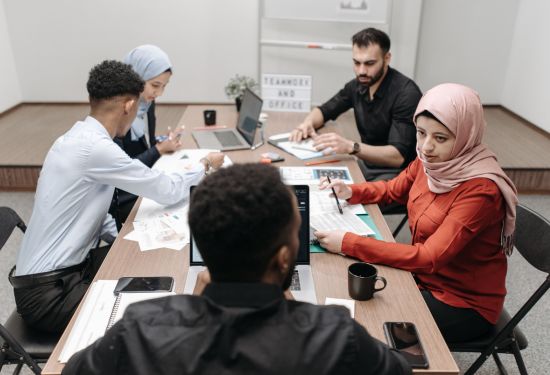The global development dialogue is pivotal in shaping international development in an increasingly interconnected world. This dialogue is a series of conversations and a dynamic process where ideas, policies, and strategies converge to address the multifaceted challenges of global growth and sustainability. The global development discussion is a cornerstone for sustainable development and international cooperation by fostering collaboration among nations, NGOs, policymakers, and young professionals.

Importance of the Dialogue
The significance of the global development discussion cannot be overstated. It serves as a platform for fostering collaboration, sharing best practices, and creating synergies among various stakeholders involved in international development. The dialogue:
- Facilitates Exchange of Ideas: It brings together key players from different sectors to discuss International Development Talks, Global Growth Discussions, and Development Policy Debates. This exchange is crucial for understanding diverse perspectives and crafting holistic solutions.
- Promotes Sustainable Growth: Through Global Sustainability Dialogues, the dialogue ensures that development strategies align with sustainability goals, addressing current needs and future challenges.
- Strengthens Policy Making: The insights gained from Global Development Policy Analysis help formulate effective policies informed by ground realities and empirical data.
Key Themes and Topics Discussed
Recent global development talks have focused on critical themes that resonate deeply with sustainable and inclusive growth mindset. Some of the key areas of focus include:
Climate Change and Environmental Sustainability
Climate change remains a dominant theme in Worldwide Economic Development Forums. Discussions revolve around strategies for mitigating environmental impacts, promoting renewable energy, and ensuring sustainable use of natural resources. Examples include cross-border initiatives to combat deforestation and promote green technologies.
Economic Inequality and Inclusive Growth
Economic disparity is another pressing issue addressed in Global Growth Discussions. Dialogue participants explore ways to bridge the gap between the rich and the poor, focusing on inclusive growth strategies that ensure equitable wealth distribution. Case studies often highlight successful poverty alleviation programs and inclusive financial systems.
Health and Education
Global Sustainability Dialogues also emphasize the importance of health and education as foundational pillars for sustainable development. Topics such as universal healthcare access, educational reforms, and capacity-building initiatives are frequently discussed, with examples from countries that have made significant progress in these areas.
Innovation and Technology
The role of technology in driving development is a recurring theme in International Development Strategies. From digital transformation to smart infrastructure, discussions highlight how innovation can catalyze growth and improve quality of life. Examples include the use of AI in healthcare and the implementation of smart city projects.
Impact and Outcomes of Global Development Dialogue
The tangible effects of the global development dialogue are evident in both global policies and local initiatives. By creating a collaborative environment, the dialogue has resulted in:
- Enhanced Policy Frameworks: Policies shaped by the dialogue are more comprehensive and practical as they incorporate insights from diverse stakeholders and empirical evidence.
- Successful Programs and Projects: Many development programs and projects succeed due to the strategies discussed during the dialogue. For instance, cross-border development initiatives in South Asia have significantly improved regional cooperation and economic integration.
- Increased Awareness and Engagement: The dialogue raises awareness about critical development issues and engages a broader audience, including young professionals and grassroots organizations.
Voices from the Field
Personal insights from participants add a rich, authentic layer to the global development dialogue. Here are some perspectives from young professionals, NGOs, and policymakers:
- Young Professionals: Emerging leaders in Pakistan have found the dialogue to be an invaluable resource for networking and professional growth. “Participating in the global growth discussion has opened doors to new opportunities and collaborations,” says Ayesha, a young entrepreneur from Karachi.
- NGOs: For NGOs, the dialogue provides a platform to voice grassroots concerns and influence policy. “It’s a space where our on-the-ground experiences can shape national and international policies,” notes Saeed, an NGO worker from Lahore.
- Policy Makers: Government officials appreciate the dialogue’s role in refining policy strategies. “The insights we gain here are instrumental in shaping effective development policies,” shares Ahmed, a policy advisor from Islamabad.

Looking Ahead: Future Trends and the Evolving Nature of the Dialogue
The global development dialogue constantly evolves to address emerging challenges and leverage new opportunities. Future trends likely to shape the dialogue include:
- Digital Transformation: As technology evolves, digitalization will play a more significant role in development strategies. Expect increased focus on digital inclusion and the use of blockchain and AI in development projects.
- Sustainable Finance: Innovative financing mechanisms, such as green bonds and impact investing, will become tools for funding sustainable development initiatives.
- Global Health Security: In the wake of the COVID-19 pandemic, global health security will remain a key focus, emphasizing building resilient health systems and ensuring equitable access to vaccines and treatments.
Conclusion
The global development dialogue is more than a series of discussions; it catalyzes change, drives sustainable growth, and fosters international cooperation. By bringing together diverse voices and perspectives, the dialogue encourages innovative solutions to complex global challenges.
As young professionals, NGOs, and policymakers continue to engage in these conversations, the dialogue’s impact will only grow, leading to more effective policies and successful development initiatives.
Let’s continue championing the global sustainability dialogue, ensuring it remains a powerful tool for empowering change and shaping a better future for all.
FAQs
What is the primary purpose of the global development discussion?
The primary purpose of the global development dialogue is to foster international cooperation and encourage innovative solutions to complex global challenges by bringing together diverse voices from various sectors.
How can young professionals benefit from participating in the dialogue?
Young professionals can benefit by networking, gaining insights from experienced leaders, and accessing new opportunities and collaborations to advance their careers and initiatives.
What are some key themes discussed in the Development Policy Debates?
Key themes include climate change and environmental sustainability, economic inequality and inclusive growth, health and education, and the role of technology and innovation in driving development.
How can NGOs influence global development policies through the dialogue?
NGOs play a crucial role in the global development dialogue by bringing grassroots perspectives and on-the-ground experiences into policy discussions. By actively participating in the dialogue, NGOs can shed light on the real-world impacts of policies, advocate for the needs of marginalized communities, and collaborate with policymakers to craft more effective and inclusive development strategies.

